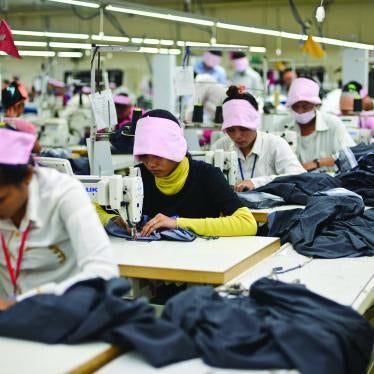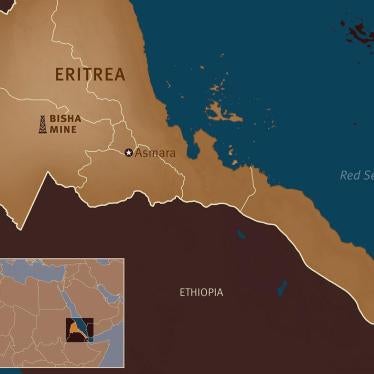Human Rights Watch welcomes the opportunity to provide comments on Australia’s model Modern Slavery in Supply Chains Reporting Requirement. According to the International Organization for Labour, an estimated 40 million people around the world are effectively being held in slavery-like conditions, including forced labor, debt bondage, and human trafficking, making it incumbent upon governments across the globe commit to combatting all forms of modern slavery found throughout supply chains and operations.[1]
We appreciate the Australian government’s desire to build upon its existing commitments to fighting modern slavery through the criteria outlined in its model requirement. However, we are concerned that the new requirement will not have a meaningful impact in many instances of modern slavery as it does not include tangible ways to achieve its intentions or require the implementation of key elements. For example, the proposed requirement would merely rely on companies’ disclosures, rather than mandating supply chain transparency or human rights due diligence through substantive steps to assess, prevent, and mitigate modern slavery risks. In addition, the proposed requirement does not carry penalties for noncompliance, rendering the requirements toothless. We are also concerned that the minimum threshold for application of the proposed requirement is higher than that of other laws, and would thus exclude some of the most problematic sectors.
Finally, the government has failed to guarantee resources to ensure adequate enforcement of the law. For example, the proposal supports the principle of supply chain transparency but is silent when it comes to determining how transparency can be achieved. It is only when companies have guidance on how to be transparent about and best report on their supply chains that workers and their advocates can quickly alert them to labor abuses and seek remedies.
Based on Human Rights Watch’s research and advocacy on human rights in global supply chains, we submit the following recommendations on how to strengthen the proposed law so it can be a serious tool to combat modern slavery in all its forms.[2]
- The regulation should require transparency of supply chains and operations.
The Australian government indicates that one of its primary objectives in the model is to “develop and maintain responsible and transparent supply chains.” In the aggregate, the reporting criteria should create greater transparency, but businesses are left “with the flexibility to determine what, if any, information they provide against each of the four criteria and whether to include any additional information.” The government should provide detailed guidance to businesses on how to be transparent about their operations and supply chains.
With the goal of achieving meaningful transparency, Human Rights Watch recommends that the law create a level playing field on transparency by introducing mandatory minimum transparency standards by sector, including identifying and publishing entities along the supply chain. Companies should also be required to disclose any modern slavery found to be present in their supply chains and operations, and disclose their methods of ensuring appropriate remedies.
- The regulation should require companies to undertake substantive human rights due diligence.
The proposed law is based on reporting on “modern slavery risks present in the entity’s operations and supply chains” and “the entity’s due diligence processes relating to modern slavery in its operations and supply chains and their effectiveness.” However, the model also clarifies that the Australian government will not in fact mandate “implementing due diligence requirements or broader human rights-based reporting,” leaving human rights due diligence as a recommendation rather than a requirement.
Mandating due diligence would mean that companies identify, prevent, mitigate, and remedy instances of modern slavery in their supply chains, supporting efforts to end abuses in supply chains. Mandatory reporting on meaningful due diligence requirements is also required to promote transparency and foster accountability. This includes enumerating potential modern slavery risks and explaining how to go about identifying them in operations and supply chains and reporting on them in a way that is comprehensible to the public. Without clear guidelines and requirements for due diligence and disclosure, reporting under the proposed law would be limited to information at the discretion of each company, limiting its usefulness and impact in addressing modern slavery.
- The size threshold for companies should be lower and apply to government purchasing. Industry-specific requirements should be implemented.
We support the application of Australia’s proposed modern slavery reporting requirement to companies both headquartered and operating in Australia. However, the proposal that the law apply to companies with annual revenues of AU$100 million or more should be eliminated or lowered. While the Australian government says that the threshold is “broadly consistent with other thresholds,” it is considerably higher than that of the United Kingdom, which requires reporting from companies with turnovers of more than £36 million (approximately AU$60 million). It is also higher than Australian thresholds for other regulatory acts. In the Australian Corporations Act of 2001, for example, the financial reporting requirement is set at an annual consolidated revenue of AU$25 million.[3] This illustrates what the Australian government considers to be large companies that can bear the burden of such reporting requirements.
Human Rights Watch recommends the government eliminate or lower the revenue threshold for companies subject to the law, and instead include all industries in which modern slavery is either known to exist or where there is a high likelihood for abuses in supply chains. In the case that the threshold is lowered, the law should be based on aggregate revenue, including that of subsidiaries.
Australia should consider implementing regulation requirements to specific industries that have a historical incidence of modern slavery. The European Union has created industry-specific regulations for conflict minerals and timber, which Australia could use as a template.[4] The United States Dodd Frank Act’s Section 1502 creates regulations regarding conflict minerals, including transparency guidelines for posting information on company websites.[5] The US Congress passed this law to restrict financing of conflict that contributed to an emergency humanitarian crisis in the Congo.[6] Similar logic could be used to combat modern slavery in supply chains. This type of regulation could apply to any high-risk industry, such as textiles, seafood, and tobacco.
Finally, to leave no doubt that the Australian government does not tolerate modern slavery, that it is committed to ethical sourcing, and that it intends to use its own buying power to compel companies to act responsibly, the government should commit to applying these reporting and regulation standards to its own purchasing practices. The Australian government should only procure goods from compliant companies.
- There should be penalties for non-compliance with the regulation.
The proposed modern slavery reporting requirement currently has no penalty for non-compliance with the regulation, saying “as in the UK, the Australian Government will not include punitive penalties for non-compliance.” The government suggests that public criticism would be an enforcement mechanism.
Public criticism has not created compliance in the UK. To date, 75 statements have been made to comply with the UK’s Modern Slavery Act. Of these 75, only 22 meet all the legal requirements. Further, only 9 statements meet the legal requirements and report on all the criteria suggested in the UK Modern Slavery Act.[7]
In contrast, the French “Duty of Vigilance” law includes a provision for injunctive relief if companies do not comply with their due diligence.[8] This creates a duty of care for companies to perform due diligence. A similar mechanism in the proposed Australian regulation could push Australian industry toward greater compliance and ultimately reduce the incidence of modern slavery in supply chains.
- There should be a civil course of action for modern slavery in supply chains.
Even though the model law requires reporting, there are no legal consequences for companies that fail to do so. The UK has a similar approach, and nongovernmental organizations monitoring its law have found that only 14 percent of companies that submitted reports complied with the basic reporting requirements.
When companies choose not to follow reporting requirements at the expense of workers in their supply chain, the government needs to ensure that workers around the world have a clear path to remedy and justice, including access to Australian courts. Some countries are taking steps to address remedy gaps. For example, the French “Duty of Vigilance” law allows people to bring a claim in court if a company is not following through with the law. Australia should similarly create avenues for redress, such as a civil course of action, for workers harmed by companies that fail to identify and address forced labor and other conditions amounting to slavery in their supply chains.
- The Australian government should provide the proper budget and central infrastructure to ensure reporting and promote transparency.
The proposed Australian law should be accompanied by proper budget and infrastructure to publicly periodically report on its implementation. In the textile sector, the Bangladesh Accord on Fire and Building Safety provides a useful model of transparent reporting, which can be built upon.
Companies should also communicate with those countries and business entities tied to the production, export, or import of such goods, what steps they should take to address the use of forced labor, slave labor, child labor, or labor of persons who have been trafficked. The Australian government’s website for reporting should also include guidelines for ways to remedy the use of forced labor, child labor, labor of persons who have been trafficked, and slave labor.
[1] Global Estimates of Modern Slavery, International Labour Organization, Geneva, 2017, http://www.ilo.org/wcmsp5/groups/public/---dgreports/---dcomm/documents/publication/wcms_575540.pdf (accessed October 17, 2017).
[2] Human Rights Watch has done extensive research and writing on human rights in supply chains, see for example, Human Rights Watch, “Follow the Thread: The Need for Supply Chain Transparency in the Garment and Footwear Industry,” April 20, 2017, https://www.hrw.org/report/2017/04/20/follow-thread/need-supply-chain-transparency-garment-and-footwear-industry; “Human Rights in Supply Chains: A Call for a Binding Global Standard on Due Diligence,” May 30, 2016, https://www.hrw.org/report/2016/05/30/human-rights-supply-chains/call-binding-global-standard-due-diligence; “The Harvest is in My Blood: Hazardous Child Labor in Tobacco Farming in Indonesia,” May 24, 2016, https://www.hrw.org/report/2016/05/24/harvest-my-blood/hazardous-child-labor-tobacco-farming-indonesia.
[3] Corporations Act 2001, Chapter 2M Financial reports and audits, https://www.legislation.gov.au/Details/C2017C00129/Html/Volume_2#_Toc479587953 (accessed October 18, 2017). See also http://asic.gov.au/regulatory-resources/financial-reporting-and-audit/preparers-of-financial-reports/are-you-a-large-or-small-proprietary-company/ (accessed October 18, 2017).
[4] Regulation (EU) 2010/995 of the European Parliament and of the Council as of 20 October 2010, http://eur-lex.europa.eu/LexUriServ/LexUriServ.do?uri=OJ:L:2010:295:0023:0034:EN:PDF (accessed October 17, 2017); and Regulation (EU) 2017/821 of the European Parliament and of the Council of 17 May 2017, http://eur-lex.europa.eu/legal-content/EN/TXT/PDF/?uri=OJ:L:2017:130:FULL&from=EN (accessed October 17, 2017).
[5] U.S. Securities and Exchange Commission, Fact Sheet, Disclosing the Use of Conflict Minerals https://www.sec.gov/opa/Article/2012-2012-163htm---related-materials.html (accessed September 21, 2017).
[6] Id.
[7] “Register of slavery & human trafficking corporate statements released to date to comply with UK Modern Slavery Act”, Business & Human Rights Resource Centre https://business-humanrights.org/sites/default/files/documents/CORE%20BHRRC%20Analysis%20of%20Modern%20Slavery%20Statements%20FINAL_March2016.pdf (accessed September 19, 2017).
[8] “French Companies Must Show Duty of Care for Human and Environmental Rights” http://www.jdsupra.com/legalnews/french-companies-must-show-duty-of-care-56981/ (accessed September 19, 2017).






